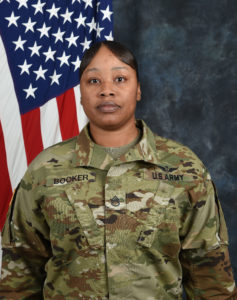
By Staff Sgt. Phoebe Booker, Equal Opportunity NCO, U.S. Army Operational Test Command, Fort Hood, Texas
Today, women’s equality has grown to mean much more than just sharing the right to vote.
Organizations’ such as Equality Now and Womankind Worldwide continue to work to provide women across the globe with equal opportunities to education and employment, pushing against suppression and violence towards women and against the discrimination and stereotyping which still occur in every society.
Over the last century, great women have proved these views wrong as the world has witnessed just what women are capable of achieving, from the likes of Rosa Parks and Eleanor Roosevelt fighting for civil rights and equality, to great scientists such as Marie Curie, Rosalind Franklin and Jane Goodall.
The Department of Defense has its own crop of females who have risen against all odds, although less well-known.
Comedian, actor and singer Bea Arthur was a truck driver and clerk typist in the Marine Corps.
Army Gen. Ann E. Dunwoody served the Nation for 38 years and was the first woman to achieve four-star rank in any military service, and retired as the commander of the Army materiel Command, where she was in charge of more than 69,000 employees in the 50 states and 145 countries.
Grace Murray Hopper was an American computer scientist who earned a master’s degree (1930) and a Ph.D. (1934) in mathematics from Yale. After Pearl Harbor was bombed, she wanted to serve, but her efforts to join the military were rejected because of her age and small size, but she persisted anyway. She joined the U.S. Naval Reserve (Women’s Reserve) in December 1943, and at 79, she retired as a rear admiral.
Eileen Collins is a retired Air Force colonel, first female astronaut to pilot a Space Shuttle, and was a flight instructor and test pilot.
Harriet Tubman was born into slavery, became an abolitionist, armed scout and spy for the Army during the Civil War, rescued slaves via the Underground Railroad, and was active in the women’s suffrage movement.
Elsie S. Ott pioneered air evacuation of military casualties during World War II, when as a second lieutenant, she was the first nurse to prepare injured for evacuation by air ambulance.
They were all capable of achieving greatness, seizing opportunities to show and do what they felt was right.
Many of their names are lost to history, but we will never forget their actions. Social change comes like a great rising wave on the ocean - powerful, unyielding, sweeping history along in its path.
Great social change comes about when of a vast movement of many courageous people, both men and women, refuse to back down. They were the people who marched day after day. Despite the fear of violence or verbal attacks, they returned again and again to continue fighting.
There were women who were arrested and went to prison; willing to stand up for what they believed in, and once there, went on hunger strikes and endured beatings and forced feedings. They were the women who fought for their daughters’ right to vote and to be treated like an equal citizen. There also were men who were mocked and laughed at when they spoke to other men of the need for women’s equality.
We must remember today that although we have come a long way towards equality, there is still much to be done.
Today should remind us to support women’s struggles for equality throughout everyday life — from the glass ceilings in our workplaces to the evolving roles in the home; from opportunities on the sports field to female leadership in upper echelon boardrooms; from the images representing women in videos and magazines to the way women view themselves; from empowering young mothers to supporting women preparing to retire; from encouraging greater female involvement in the science and technology fields to promoting women’s campaigns for public office and leadership in government institutions.
As long as women are underrepresented or misrepresented in these places and other places in our society, there is still work to be done. And as long as women around the world fight for equal rights, the struggle continues.
~~
The U.S. Army Operational Test Command is based at West Fort Hood, Texas, and its mission is to make sure that systems developed are effective in a Soldier’s hands and suitable for the environments in which Soldiers train and fight. Test units and their Soldiers provide feedback by offering input to improve upon existing and future systems with which Soldiers will ultimately use to train and fight.
